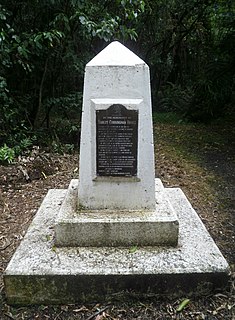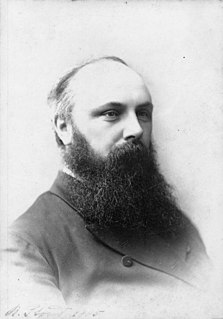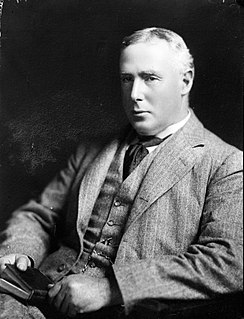
Sir William Jukes Steward was a New Zealand politician and the first Liberal Speaker of the New Zealand House of Representatives. He represented South Canterbury electorates in Parliament for a total of 34 years, before being appointed to the Legislative Council. He served briefly on the Otago Provincial Council and was Mayor of Oamaru for three years.

Napier is a New Zealand parliamentary electorate, returning one Member of Parliament to the House of Representatives. It is named after the city of Napier, the main urban area within the electorate. The electorate was established for the 1861 election and has existed since. Since the 2014 general election, Napier has been held by Stuart Nash of the New Zealand Labour Party. Previously, it had been held by Chris Tremain of the New Zealand National Party, who stood down prior to the 2014 election.

William Hutchison was a New Zealand politician and journalist. Hutchison and his son George were both Members of Parliament.

Sir George Hunter was a New Zealand politician of the Reform Party. Born in Wellington, he took over his father's large landholding in the Hawke's Bay at age 18. He was a breeder of sheep and race horses, with his horse Cynisca winning the Wellington Cup three times in a row. Hunter was prominent in local politics, and represented the Waipawa electorate in the House of Representatives for a total of 22 years.

Arthur Winton Brown JP was the Mayor of Wellington, New Zealand in 1886 and 1891. He died at New Orleans, Louisiana.

John Duthie was a politician and businessman in New Zealand. Originally from Scotland, he came to Auckland in 1863. He set up his own ironmongery in New Plymouth, then Wanganui, and he finally settled in Wellington. In the latter city, he was mayor for one term. He then represented Wellington in Parliament for a total of eleven years. For the last two years of his life, he was appointed to the New Zealand Legislative Council.
Bay of Islands is a former New Zealand parliamentary electorate. It existed during various periods between 1853 and 1993. It was thus one of the original 24 electoral districts, and New Zealand's first ever MP was elected, although unopposed, in the Bay of Islands; Hugh Carleton thus liked to be called the Father of the House.
Avon is a former New Zealand parliamentary electorate. It was created for the 1861 general election and existed until 1996. It was represented by 13 Members of Parliament and was held by Independents, Liberal Party or Labour Party representatives.
Lyttelton is a former New Zealand parliamentary electorate. It existed from 1853–90, and again from 1893–1996, when it was replaced by the Banks Peninsula electorate.
Inangahua is a former parliamentary electorate in the Buller District, which is part of the West Coast region of New Zealand, from 1881 to 1896. The town of Inangahua Junction, which gave the electorate its name, was located in the adjacent Buller electorate until 1887.
Port Chalmers then Chalmers was a parliamentary electorate in the Otago Region of New Zealand, from 1866 to 1938. It was centred on the town of Port Chalmers, the main port of Dunedin and Otago.
Caversham was a parliamentary electorate in the city of Dunedin in the Otago region of New Zealand, from 1866 to 1908.
Wellington Suburbs was a parliamentary electorate in Wellington, New Zealand. It existed from 1893 to 1902, then from 1908 to 1911, and from 1919 to 1946. The electorate was represented by six Members of Parliament.
Wellington, was a parliamentary electorate in Wellington, New Zealand. It existed from 1853 to 1905 with a break in the 1880s. It was a multi-member electorate. The electorate was represented, over the years, by 24 Members of Parliament.
Dunedin or the City of Dunedin or the Town of Dunedin was a parliamentary electorate in the city of Dunedin in Otago, New Zealand. It was one of the original electorates created in 1853 and existed, with two breaks, until 1905. It was the only New Zealand electorate that was created as a single-member, two-member and three member electorate.

John Stevens was a Liberal Party Member of Parliament in New Zealand.

Robert Cunningham Bruce was a Scottish-born sailor, New Zealand politician and conservationist.

This is a summary of the electoral history of Sir Robert Stout, Prime Minister of New Zealand, (1884–1887).

The 1896 Wellington City mayoral election was part of the New Zealand local elections held that same year. The polling was conducted using the standard first-past-the-post electoral method.













